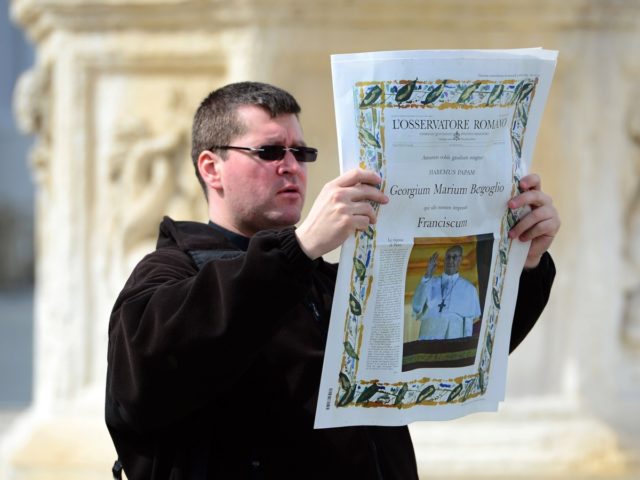ROME — Pope Francis underscored the low circulation of L’Osservatore Romano, the Vatican’s semi-official newspaper Monday, insisting the numbers do not do justice to the work involved.
“Thank you for your work, for what you do,” the pontiff said during a live radio broadcast from the Vatican’s communication department. “I have only one concern — there are many reasons to be concerned about the Radio, about L’Osservatore Romano — but one that touches my heart: how many listen to the Radio, and how many read L’Osservatore Romano?”
The newspaper, which was founded in 1861, is currently published in nine languages. According to a report in Il Sole 24 Ore, L’Osservatore Romano has a circulation of just 15,000 copies.
“Our work is to reach the people, to make sure that the work we do here — which is beautiful, great, and laborious — reaches the people, both with translations and also by short waves,” Francis continued. “The question you must ask is: How many? How many people does it reach?”
There is a danger for all organizations, he continued, “that despite a good organisation, good work, it doesn’t get where it needs to go.”
The pope compared the work of the Vatican communications office to Aesop’s fable of a mountain that gives birth to a mouse, warning against grandiose-sounding projects that do not deliver what they promise.
“Every day ask yourself this question: how many people do we reach?” Francis continued. “How many people get the message of Jesus through L’Osservatore Romano? This is very important, very important!”
After his radio address, the pope met with the Vatican editors, in which he also warned them against excessive bureaucracy.
Francis compared “this large and complicated system” to a negative tendency he had encountered in his native Argentina whereby everything was beautiful but “it didn’t work.”
“The important thing is that all this beauty, all this organisation works,” he told them, noting that the great enemy of an efficient organization is “functionalism.”
The pope went on to describe a situation in which every section head has seven under-secretaries, who have no decision-making authority and therefore are “useless.”
Such undersecretaries are “incapable of deciding, incapable of taking the initiative,” Francis said. “Functionalism is lethal. It puts an institution to sleep and kills it.”
“Be careful not to fall into this trap: it doesn’t matter how many places there are, whether the studio is beautiful or not. What matters is that it works, that it is functional, and not a victim of functionalism,” he said.
Because “if a work is too well ordered, it ends up caged and is not useful,” he added. “This is the only thing that, seeing such a beautiful organisation, so well done, seeing all of you together, I have to say: be careful! No functionalism.”
For a structure to be functional, he concluded, “everyone must have sufficient freedom to function. That they have the ability to take risks and not go asking for permission, permission, permission…: this paralyses.”

COMMENTS
Please let us know if you're having issues with commenting.